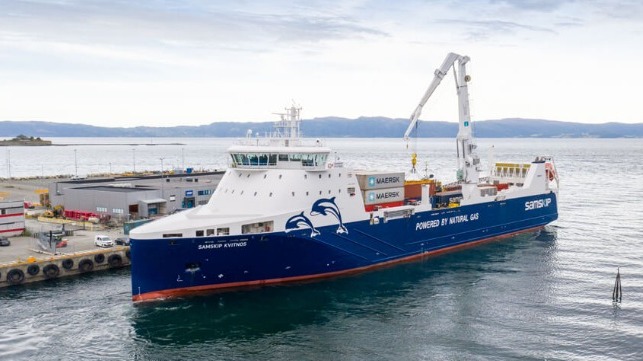Project Explores Retrofit for LNG Cargo Ship to Hydrogen-Powered Fuel Cells

Norway is funding another project to explore the potential of converting an LNG-fueled multipurpose cargo ship to operate with fuel cells and hydrogen fuel. ENOVA, the Norwegian government fund designed to support initiatives to accelerate decarbonization will provide funding to logistic provider Samskip along with partners TECO 2030 and Blom Maritime to develop the plans for the conversion.
The project will be working with Samskip’s 2015-built vessel Samskip Kvitnos, a 4,900 dwt RoRo cargo vessel. The Kvitnos operates from Rotterdam north along the Norwegian coast as far north as Hammerfest. The project is the latest in a series of efforts sponsored by ENOVA that look to employ hydrogen to decarbonize operations along the Norwegian coast.
“With the delivery of our LNG-propelled multipurpose vessels back in 2015, Samskip already offered one of the world’s most environmentally friendly cargo ships,” said Are Grathen, Samskip Regional Director Norway and Sweden. “With this grant from Enova, and in close cooperation with fuel cell provider TECO 2030, we will continue our endeavor to enable full zero-emission propulsion which in turn will further pave the way for our H2-propelled newbuilds coming out next year and bring us closer to our net-zero targets for 2040.”
The goal of the project is to prepare the designs and explore the feasibility of converting the 394-foot (120-meter) vessel to hydrogen operations. The information will be used for an investment decision to retrofit Kvitnos. The project also aims to facilitate long-term hydrogen fuel supply contracts based on the vessel’s fixed route along the Norwegian coast.
Blom Maritime will support the project with naval architects, piping engineers, and structural engineers to produce the documentation needed to obtain preliminary approval for the fuel cell and hydrogen solution. Blom Maritime has its main expertise in engineering for retrofitting solutions, a great strength for this project.
TECO 2030 would supply the fuel cells and hydrogen fuel. They will contribute their knowledge of hydrogen propulsion to the design project.
Samskip highlights that it already has one hydrogen-powered container vessel under construction in the SeaShuttle project. This new retrofit project with Kvitnos may become Samskip’s second hydrogen project.
The SeaShuttle project was launched in 2023 with an order from India’s Cochin Shipyard to build two vessels which are being called the world’s first zero-emission feeder container vessels. The contract calls for ships with a nominal capacity of approximately 500 TEU (365 45-foot containers reports the shipyard). They will be hydrogen-powered and designed for remotely controlled, and autonomous-ready operations between the Oslo Fjord and Rotterdam. Construction began in March 2024 on these vessels.
No comments:
Post a Comment